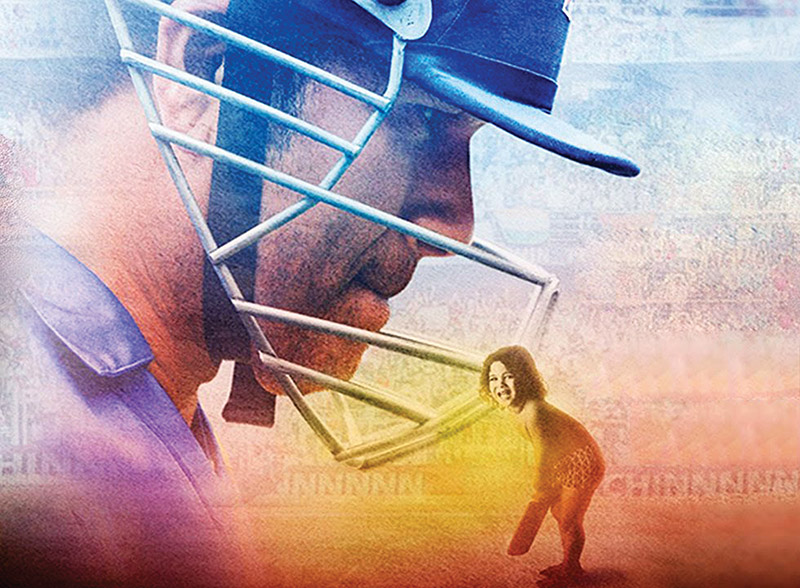
There are some chants you can’t just get out of your head. They’re not earworm (anyone remember Pen, Pineapple, Apple, Pen?) but instead, something that plays over and over in your mind when you’re looking for inner resilience and to spur you on when you need a little extra something to nudge you over the finish line. For more than one billion Indians, though, there is only one chant that resonates through time, irrespective of gender, age, or where they’re from.
‘Sachin, Sachin’ isn’t just a chant, isn’t just a couple of words, but a lot more than that. It represents the emotions, the hopes, the beliefs of a nation, a nation that didn’t just think of the man behind the chant as a person, but a one of their very own, who was a hero to all of them.
Sachin: A Billion Dreams allowed India’s very own sporting Superman to finally remove his metaphorical cape, return to the pavilion, and allow us to see the man he truly is. It’s not always easy to separate the athlete from the person, and Sachin Tendulkar’s visual biopic shows you exactly why this is so.
Directed by Emmy nominated Brit James Erskine, who specialises, by the way, in bringing soul-stirring sport to the big screen, the movie is a thrilling melange of archival footage – some of it Sony ESPN’s glossily presented footage – the rest, home videos and painstakingly gathered video material, some of which still has that sepia tint that was so common was Sachin was growing up in Mumbai’s suburbs in the 1980s.
We’d always assumed it’d been an easy ride for the Master Blaster to knock his opponents out of the park without giving it a second thought, but A Billion Dreams shows you just how much hard work, determination and sacrifice not just Sachin, but his entire family, had to go through, just to ignite his dream of one day pulling on the sacred blue of his nation.
One scene, for example, narrated by Sachin himself, shows us just how hard he used to have it, being forced to move from his parents’ home to his aunt’s just because it was closer to Shivaji Park, the ground where he honed his now world-famous batting skills. “I used to get up by 6am and go to school in the morning, and after that, I used to go straight to the cricket ground,” says Sachin, who narrates the entire story. “My school work and my cricket meant I used to have very little time for myself, and every day used to end the same way: I used to lie down, my mother used to press my feet, and my aunt fed me hot food every night.”
One of the reasons India – and the world – accepted Sachin as the sport’s everyman – was because he’d never been swayed by the riches of the sport, or forgotten his roots. His parents aside, a huge influence in Tendulkar’s development was the man who made it all happen behind the scenes: His coach, Ramakant Achrekar. “Ramakant sir (something tells me he will always remain ‘sir’ to Sachin) used to drive me to matches on his own scooter, up and down Mumbai,” extolls Sachin, in yet another vignette. “Sometimes, I would play two cricket matches in the same day.”
The wonder, the magic of sport is how something so simple can bring about a rollercoaster of emotions – all of them in quick succession, sometimes simultaneously – and it’s hard to not see tears prickle the back of your eyes as your heart burns with fierce pride as you watch Sachin’s story unfold.
From his first ever overseas trip – he was flung straight into the deep end, an overseas tour to Pakistan – facing the deadly pace attack of Wasim Akram and Waqar Younis – the former famously told him, “you’ll get no free rides here, the only ride you’ll get is from the hotel to the stadium” – to fronting up against the legendary Shane Warne, being one of the first to beat the leg-spinner at his own game –the lessons Sachin learned on the pitch clearly shaped him to be the man he became.
He was equally influenced by incidents off of it: The harrowing hell he and his family had to go through, not once, not twice, but many a time – the match-fixing scandals which implicated Mohammed Azharuddin, the country’s abysmal showing at the 2007 Cricket World Cup, and the tumultuous time he had captaining the side – all of which made him run a gamut of emotions, but made him a better player for it.
Through all of this, though, Sachin always had the support of his family, who were his refuge during times of trial and the first people he’d celebrate all his successes with. The superlatives used to describe them in this film shed some light on the foundations – and the cost – of just what it took for Sachin to achieve his dream.
And that, really, is a metaphor for Sachin: A Billion Dreams, for it is a glimpse into the soul of this superstar, one who was thrust into the limelight, but never fazed by it. One that doesn’t just make us admire Sachin the cricketer, but also makes us love Sachin the human being.
One that helps us remember Sachin Tendulkar in more ways than one. —[email protected]
The Short and Skinny
Name: Sachin: A Billion Dreams
Genre: Sports/Biographical
Producer: James Erskine and 200 Not Out Productions
What’s it about: What made Sachin Tendulkar the player who inspired a nation? This spellbinding movie lifts the lid on one of the world’s most loved and adored cricketers.
Starring: Sachin Tendulkar, Amitabh Bachchan, Ricky Ponting, Shane Warne, Wasim Akram, Harsha Bhogle, Sunil Gavaskar, Anjali Tendulkar, MS Dhoni
Where to watch: Sachin A Billion Dreams is now running in cinemas across Oman
IMDB Rating: 9.1/10